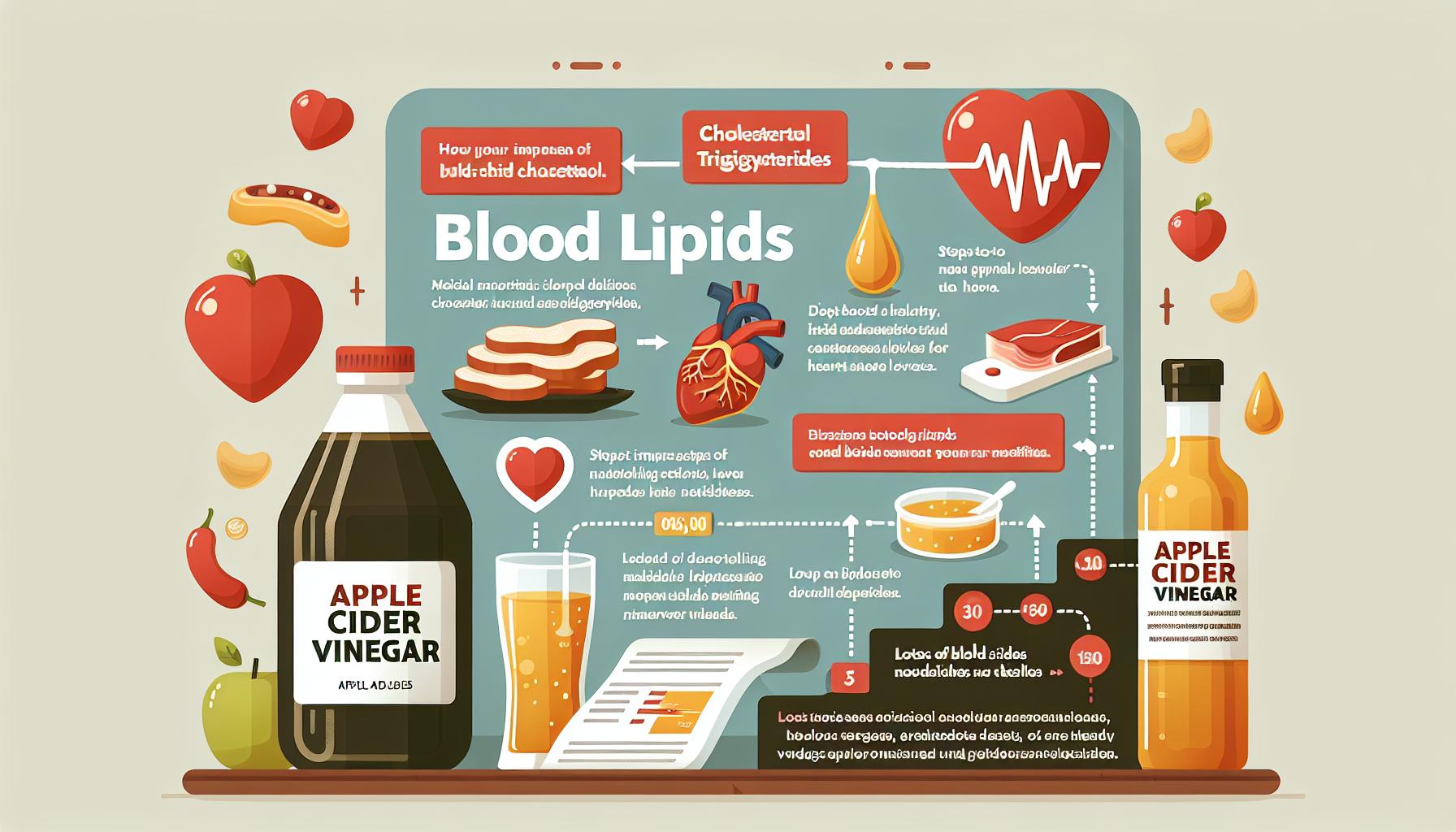Dive into nature’s well-guarded secrets and explore the powerful health benefits nestled within the humble apple! Welcome readers, in today’s post we are unearthing the health benefits gleaned from the delightful, potent brew of apple cider vinegar; not just any ordinary health benefits, but specifically its heart-healthy perks against cholesterol. Based on research findings discussed in the YouTube video: “Unlocking Nature’s Secret: Apple Cider Vinegar Against Cholesterol,” we delve into the world of blood lipids and demystify the role of this ancient potion in the quest for wellness. Come along as we traverse through interesting studies, dosage recommendations and much more, whilst answering the question: could apple cider vinegar be our secret weapon against high cholesterol? Read on to find out!

Table of Contents
- Understanding Blood Lipids and the Role of Apple Cider Vinegar
- The Role of Quality Apple Cider Vinegar in Balancing Blood Lipids
- Deciphering Scientific Research: The Impact of Apple Cider Vinegar on Cholesterol Levels
- Translating Raw Research into Personal Health Choices: Apple Cider Vinegar Dosage Recommendations
- Q&A
- The Conclusion
Understanding Blood Lipids and the Role of Apple Cider Vinegar

Blood lipids, also known as fats in your blood, comprise of your cholesterol, HDLs, LDLs and triglycerides which your doctor checks when doing a lipid panel. According to substantial medical research, apple cider vinegar has a notable impact on your blood lipids. However, it’s essential to choose a good quality apple cider vinegar – one that comes with ‘the mother’ which looks cloudy-like.
In a distinct study conducted on normal and diabetic rats, the rats were fed apple cider vinegar for four weeks and observed. The fasting blood glucose did not change, but the HbA1c, a long-term measure of blood glucose levels, significantly decreased in the diabetic group fed with apple cider vinegar. Moreover, the vinegar-fed normal rats experienced a substantial reduction of LDLs (low-density lipoprotein cholesterol – the “bad cholesterol”) and an appreciable increase in HDL (high-density lipoprotein cholesterol – the “good cholesterol”). In addition to that, the diabetic animals experienced reduced serum triglyceride levels and increased HDL levels.
| Study Result | Normal Rat | Diabetic Rat |
| LDL (“bad cholesterol”) Level | Decreased | N/A |
| HDL (“good cholesterol”) Level | Increased | Increased |
| Serum Triglyceride Level | N/A | Decreased |
Another human study titled ‘Influence of apple cider vinegar on blood lipids’ was performed on 19 participants (both male and female), looking at their blood lipid profiles. It was an eight-week trial where participants consumed 30 milliliters (two tablespoons) of apple cider vinegar twice a day.
The Role of Quality Apple Cider Vinegar in Balancing Blood Lipids

When you hear about blood lipids, most likely your mind goes straight to cholesterol tests. These fats present in your blood are what the doctor usually looks for during a lipid panel – the very basic checks including cholesterol, HDL, LDL, and triglycerides. Studies suggest that apple cider vinegar could play a significant role in managing these levels.
Let’s focus on a few intriguing pieces of research that lay the foundation for apple cider vinegar’s lipid-balancing qualities. First, a study conducted on both normal and diabetic rats observed fantastic results. Rats fed with apple cider vinegar showed a substantial decrease in LDL (something we want to lower) and a noteworthy increase in HDL (something we wish to raise). The study concludes that apple cider vinegar improves serum lipid profile across the board - in both normal and diabetic rats. Note: These results were obtained using vinegar containing ‘the mother’ – a substance present in high-quality apple cider vinegar, visible as a cloudy substance.
- Lower LDL
- Higher HDL
- Better overall lipid profile
Focusing on human trials, another study involving 19 participants (male and female), aimed to explore the influence of apple cider vinegar on blood lipids. This eight-week study had the participants consuming 30 milliliters (around two tablespoons) of apple cider vinegar twice a day. The observations were encouraging and aligned with the results from the studies with rat subjects.
| Study | Subject | Observation |
| Study on normal and diabetic rats | Rats | Improvement in Lipid profile |
| Influence of apple cider vinegar on blood lipids | 19 Human participants | Positive change in lipid profile |
The verdict from both studies? Apple cider vinegar might offer an effective, natural way to improve cholesterol profiles and hence provide a potential course to manage cardiovascular health.
Deciphering Scientific Research: The Impact of Apple Cider Vinegar Against Cholesterol

Apple Cider Vinegar (ACV), a staple in many pantries, appears to hold an immense potential in improving our blood lipid profiles, as suggested by various scientific researches. Blood lipids, essentially, are fats found in our bloodstream. When your doctor orders a lipid panel, it involves checking elements like your cholesterol, High-Density Lipoprotein (HDL), Low-Density Lipoprotein (LDL), and triglycerides. It’s noteworthy that ACV’s quality varies significantly, hence it is recommended to opt for the ones that come with ‘the mother’, a cloudy residue filled with beneficial enzymes and probiotics.
Talking about research, an interesting study was performed on both normal and diabetic rats. These rats were fed ACV for an entire month and though there weren’t any notable changes in the fasting blood glucose level, the ACV consumption led to a significant decrease in HbA1c levels in the diabetic group. Furthermore, the rats fed with ACV showed remarkable reduction in LDL and increment in HDL levels. Not only that, but there was also a notable decrease in the serum triglyceride levels and increase in the HDL level for diabetic rats. Comparatively, another study conducted on 19 human participants mirrored similar positive impacts of ACV on blood lipid profiles.
Summary of Study Results:
| Type of Subject | Results |
|---|---|
| Normal and diabetic rats | Decrease in HbA1c, LDL, and serum triglycerides. Increase in HDL |
| 19 Human Participants | Improvement in blood lipid profiles |
In a nutshell, these research findings suggest a potential boon that Apple Cider Vinegar can bestow upon our health by improving serum lipid profiles. Whether you wish to alleviate the threats of high cholesterol levels or are aiming for overall improved health, tossing in an extra spoon of the cloudy ACV might work wonders.
Translating Raw Research into Personal Health Choices: Apple Cider Vinegar Dosage Recommendations

As it turns out, scientific studies indicate that apple cider vinegar could help improve your blood lipid profile, particularly impacting on cholesterol and your HDL and LDL levels. In plain English, your ‘blood lipids’ are essentially the fats in your blood. When you get a ‘lipid panel’ at the doctor’s, these are the elements they’re testing - your cholesterol, your HDL (“good” cholesterol), LDL (“bad” cholesterol) and triglycerides.
One study on both normal and diabetic rats suggested that consumption of apple cider vinegar for four weeks resulted in a variety of positive changes. This included a marked reduction in LDL levels, and an increase in HDL - typically regarded as good outcomes in terms of heart health. The study also observed reductions in both triglyceride levels and serum markers, particularly within the diabetic rats. On this basis, the researchers concluded that apple cider vinegar may improve serum lipid profile – in rats, at least. It’s worth mentioning the quality of apple cider vinegar plays a vital role here, ideally, it should contain ‘the mother’ for optimum health benefits.
| Study on Apple Cider Vinegar & Blood Lipids | Changes Observed |
|---|---|
| Rats (Normal and Diabetic) | Down in LDL and serum triglycerides, Up in HDL |
Moving on to human studies, another trial focused on the impact of apple cider vinegar on human blood lipids. The eight-week study, involving 19 participants, gave each participant 30 milliliters (two tablespoons) of apple cider vinegar twice daily. Detailed results of the changes in their blood lipid profiles is awaited. Yet, this adds to the body of evidence suggesting a potential positive effect of apple cider vinegar on cholesterol and overall heart health.
- Dosage: 30 milliliters of apple cider vinegar twice daily
- Duration: Eight-week trial
- Participants: 19 males and females
Q&A
Q: What are blood lipids?
A: Blood lipids are the fats that are present in your blood. When your doctor orders a lipid panel, it checks your cholesterol, HDL, LDL and triglycerides, which are all types of lipids.
Q: How does apple cider vinegar impact blood lipids?
A: The studies discussed in the video suggest that apple cider vinegar can positively affect blood lipids. This means it improves the lipid profile by decreasing serum triglyceride and LDL (Low-Density Lipoprotien, also known as ‘bad cholesterol’), and increasing serum HDL (High-Density Lipoprotein, also known as ‘good cholesterol’).
Q: Are there differences in the type of apple cider vinegar that should be used?
A: Yes, the type of apple cider vinegar does make a difference. It is recommended to use apple cider vinegar that contains ‘the mother’, which essentially means it is unpasteurized and contains beneficial bacteria. Bragg’s is a suggested brand that is easy to find.
Q: What were the key findings from the studies on this topic?
A: The key findings from the two studies mentioned in the video were that apple cider vinegar significantly decreased HbA1c (a long-term blood sugar level indicator) in diabetic rats, reduced LDL cholesterol, increased HDL cholesterol, and brought down triglyceride levels. The second study done on humans revealed that taking 30 milliliters of apple cider vinegar twice a day for eight weeks positively affected the participants’ blood lipid profiles.
Q: How applicable are these findings to humans?
A: Although the first study was conducted on rats, the results from the human study aligns with the rat study, which adds more weight to the argument that apple cider vinegar can improve lipid profiles. However, it’s important to note that more extensive research and larger human trials are needed to conclusively establish the benefits.
The Conclusion
So, as we’ve journeyed today through the various studies on the potential benefits of apple cider vinegar, we’ve seen some fascinating potential for this common household item in improving blood lipid profiles. From our friendly lab rats to human trial participants, apple cider vinegar has consistently shown a positive influence on cholesterol levels. There’s always more to learn, but for now, we can say that incorporating this natural elixir, particularly those rich in the ‘mother’, may be a worthwhile strategy in your health weaponry. Remember though, your path to a healthier you is a multi-faceted one. Alongside any natural supplements, remember the importance of balanced nutrition and regular exercise. Here’s to unlocking the secrets of nature, one video at a time. Until next time, keep exploring!

